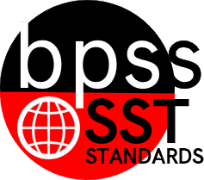6th Grade Social Studies (Archived)
Completion requirements
 BPS District Social Studies Standards Book
BPS District Social Studies Standards Book
SST-06 "I can ... statements"
Kindergarten Social Studies
1st Grade Social Studies
2nd Grade Social Studies
1st Grade Social Studies
2nd Grade Social Studies
3rd Grade Social Studies
4th Grade Social Studies
5th Grade Social Studies
4th Grade Social Studies
5th Grade Social Studies
6th Grade Social Studies
7th Grade Social Studies
8th Grade Social Studies
7th Grade Social Studies
8th Grade Social Studies
High School Social Studies
ALL
S |
|---|
SST-06.6.02
SST-06.6.02 Explain how differences among cultures (e.g., differences in beliefs and governments) often result in conflict.Student Learning Targets:Knowledge Targets
Reasoning Targets
Skills (Performance) Targets
Product Targets
Proficiency ScaleThe Student can ...(1) Beginning
(2) Developing
(3) Proficient
(4) Advanced
ResourcesVocabulary
Websites
| |

